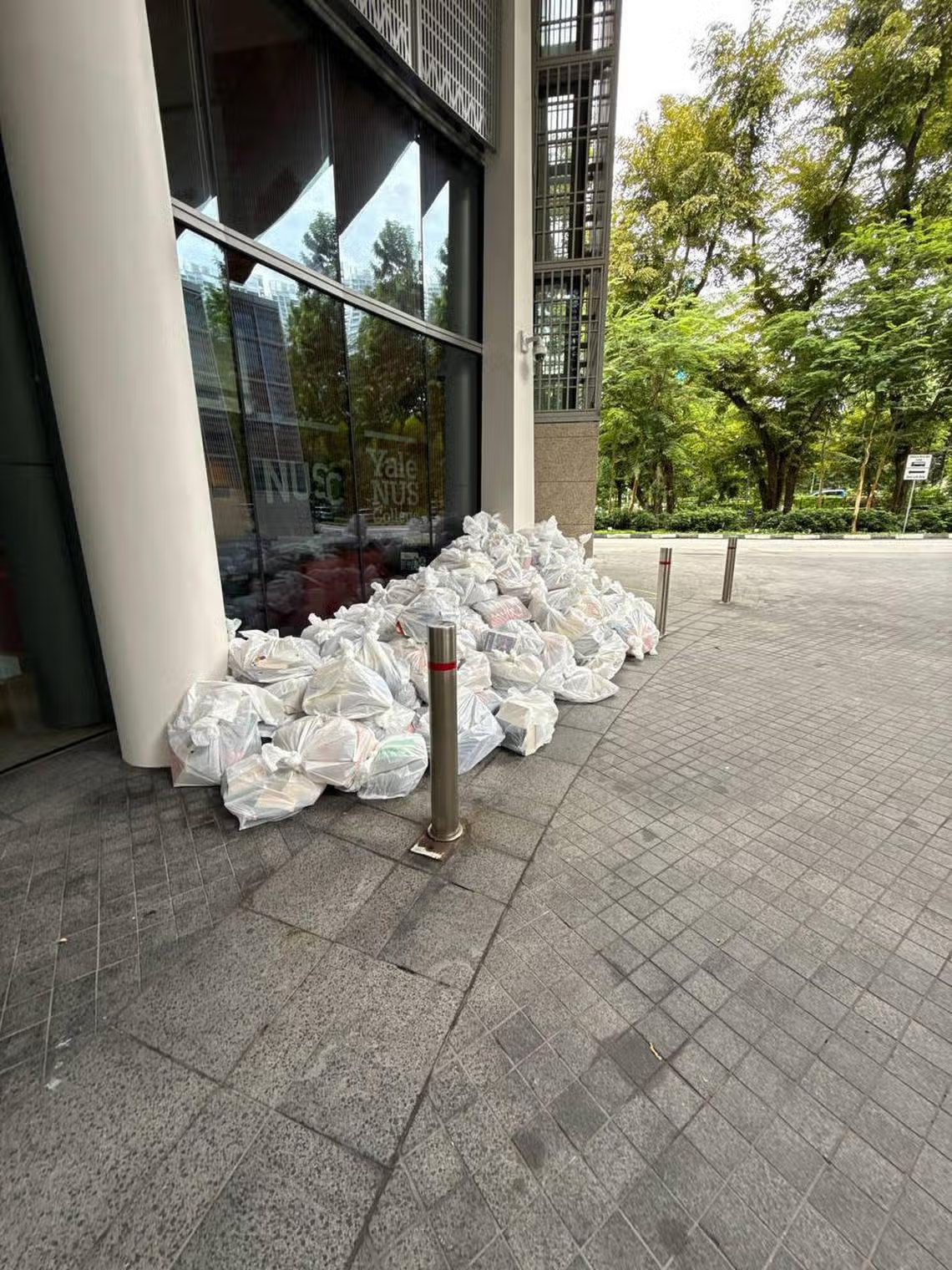May 21, 2025
SINGAPORE – Piles of plastic bags containing books at Yale-NUS College were seen being taken away by a recycling company on May 20, prompting questions and concern from alumni over what they see as a waste of academic resources.
The books, tightly packed in translucent white plastic bags, were stacked on the pavement of the college’s drop-off point located next to the National University of Singapore (NUS) University Town in Kent Ridge.
Yale-NUS alumni told The Straits Times that the materials were being cleared by Green Orange Enviro, a recycling company. Two of its employees were seen loading the bags onto a truck in the early afternoon.
The incident comes after the final weeks of Yale-NUS College’s existence, as its last cohort graduated on May 14.
The liberal arts institution, founded in 2011 through a partnership between Yale University and NUS, is being closed following an announcement in 2021 of its merger with NUS’ University Scholars Programme.
One of the employees of the recycling company, who declined to be named, told ST they were at the campus at 12pm to clear the bags of books.
He added that the books were being taken to Asia Recycling, a recycling facility in Jurong, to be shredded. Asia Recycling specialises in the recycling of paper, plastic, metal, electronics and lead acid batteries.
The employee said that around 60 to 70 bags were cleared, each weighing between 10kg and 15 kg. He added that one student tried to take a bag of books away, but was stopped by a member of the school management.
The reason behind the disposal of the books remains unclear. But the sight of books being discarded publicly sparked criticism and sadness among Yale-NUS alumni, some of whom have taken to online forums to express their disappointment.
The Straits Times has reached out to Yale-NUS and NUS for more information.
Ms Avery Huang, 23, a Yale-NUS anthropology major who graduated in 2025 and was at the scene, said she tried to speak to NUS librarians to stop them. “I found it heartbreaking that these books, which are in perfectly good condition, are being thrown away.”
She added: “It boils down to how much they care about the books and the taxpayers’ money they’ve used and are now throwing away.”
The library in the former Yale-NUS campus is under the purview of NUS Libraries.
Ms Lee Jiaying, 21, who was part of Yale-NUS’ final batch of students, rushed down to the main entrance at 11.20am after getting a text and seeing photos of bags of books at the driveway.
“These books were in brand-new, mostly untouched condition, on all kinds of popular fiction, non-fiction and academic genres,” Ms Lee said, adding that she recognised some hardcover books that retail for more than $60 in the pile.

Piles of plastic bags containing books were spotted outside the Yale-NUS College library on May 20, prompting questions and concern from students and alumni. PHOTO: THE STRAITS TIMES
Library staff had explained that books were being discarded as they were duplicates, contained “NUS RFID” tags and, for security reasons, were not allowed to be circulated, she said, adding that library staff also had a short timeline to decide what to do with the books.
“They felt they had no viable alternative and decided to dispose of them through a waste facility,” she added.
The disposal felt sudden and abrupt for students, Ms Lee said. “I felt heartbroken, seeing an unbelievable number of expensive books – many in near-perfect condition – being so carelessly discarded. It was painful to watch them thrown around like that.”
“Books are precious educational resources for communities to enjoy. In the right hands, they could have been thoughtfully cared for,” Ms Lee added. “I know many Singaporeans who put in great effort to salvage and give second-hand books a new home.
“Yet today, it felt like an entire store’s worth of books was discarded out of administrative convenience. These books could have benefited those who cannot afford to buy them, members of the public who value shared resources and curious minds who would have deeply appreciated them.”
In text messages seen by ST, some Yale-NUS alumni said they had tried to organise a donation drive or giveaway for the books, but were told that it was not possible for reasons involving the security tags attached to these books.
One Yale-NUS alumna, who wanted to be known only as Ms Yin, said: “I feel that NUS, as a global leading institution, should be able to recognise the scarcity and preciousness of intellectual resources like books.
“While there may have been issues of labour and manpower to, say, remove RFID chips on the book, I believe that we had a lot of students who were willing to volunteer their time to allow for some salvaging of books,” the 26-year-old added.
Ms Kristina Gweneth Simundo, 23, who graduated from Yale-NUS in 2024, said she felt anger and grief at this “opaque and top-down decision” by NUS. “When institutions destroy knowledge so casually, they signal a disturbing disregard for memory, inquiry and the future of learning itself.”
- Gabrielle Chan is a journalist at The Straits Times, and covers everything related to education in Singapore.
- Shawn Hoo is a journalist on the arts beat at The Straits Times. He covers books, theatre and the visual arts.

